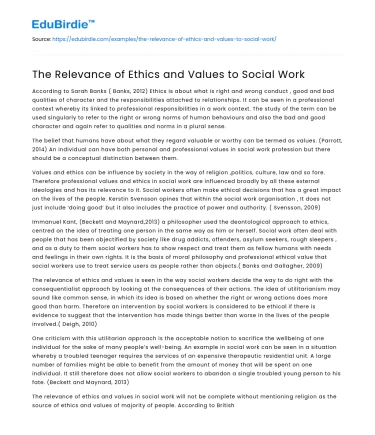According to Sarah Banks ( Banks, 2012) Ethics is about what is right and wrong conduct , good and bad qualities of character and the responsibilities attached to relationships. It can be seen in a professional context whereby its linked to professional responsibilities in a work context. The study of the term can be used singularly to refer to the right or wrong norms of human behaviours and also the bad and good character and again refer to qualities and norms in a plural sense.
The belief that humans have about what they regard valuable or worthy can be termed as values. (Parrott, 2014) An individual can have both personal and professional values in social work profession but there should be a conceptual distinction between them.
Save your time!
We can take care of your essay
- Proper editing and formatting
- Free revision, title page, and bibliography
- Flexible prices and money-back guarantee
Values and ethics can be influence by society in the way of religion ,politics, culture, law and so fore. Therefore professional values and ethics in social work are influenced broadly by all these external ideologies and has its relevance to it. Social workers often make ethical decisions that has a great impact on the lives of the people. Kerstin Svensson opines that within the social work organisation , It does not just include ‘doing good’ but it also includes the practice of power and authority. ( Svensson, 2009)
Immanuel Kant, (Beckett and Maynard,2013) a philosopher used the deontological approach to ethics, centred on the idea of treating one person in the same way as him or herself. Social work often deal with people that has been objectified by society like drug addicts, offenders, asylum seekers, rough sleepers , and as a duty to them social workers has to show respect and treat them as fellow humans with needs and feelings in their own rights. It is the basis of moral philosophy and professional ethical value that social workers use to treat service users as people rather than objects.( Banks and Gallagher, 2009)
The relevance of ethics and values is seen in the way social workers decide the way to do right with the consequentialist approach by looking at the consequences of their actions. The idea of utilitarianism may sound like common sense, in which its idea is based on whether the right or wrong actions does more good than harm. Therefore an intervention by social workers is considered to be ethical if there is evidence to suggest that the intervention has made things better than worse in the lives of the people involved.( Deigh, 2010)
One criticism with this utilitarian approach is the acceptable notion to sacrifice the wellbeing of one individual for the sake of many people’s well-being. An example in social work can be seen in a situation whereby a troubled teenager requires the services of an expensive therapeutic residential unit. A large number of families might be able to benefit from the amount of money that will be spent on one individual. It still therefore does not allow social workers to abandon a single troubled young person to his fate. (Beckett and Maynard, 2013)
The relevance of ethics and values in social work will not be complete without mentioning religion as the source of ethics and values of majority of people. According to British law and policy guidance, social workers are require to think about the religious needs of service users.( BASW). It is very challenging in a society to recognise and respond to religious needs of service users as many different religious tradition exist.(Thompson, 2006). The respect for religious beliefs should not be uncritical and can not outweigh all factors in a given situation. In both Islam and Judaism, the removal of the foreskin of young boys gives them a sense of belonging. ( O’Beirne,2004). Even though male circumcision remains legal in Uk and other countries, it can be seen as an assault and ethically wrong from the perspective of someone who does not believe in that religion. The question that one has to ask is where do one draw the line between what is acceptable in the name of religion or not. In the study of Victoria Climbie case ( Laming, 2003), it sets an example of the challenges of religion on social work. There is a necessary tension between the need to recognise the importance of religion to people and failing to challenge the religious justification of behaviours.






 Stuck on your essay?
Stuck on your essay?

